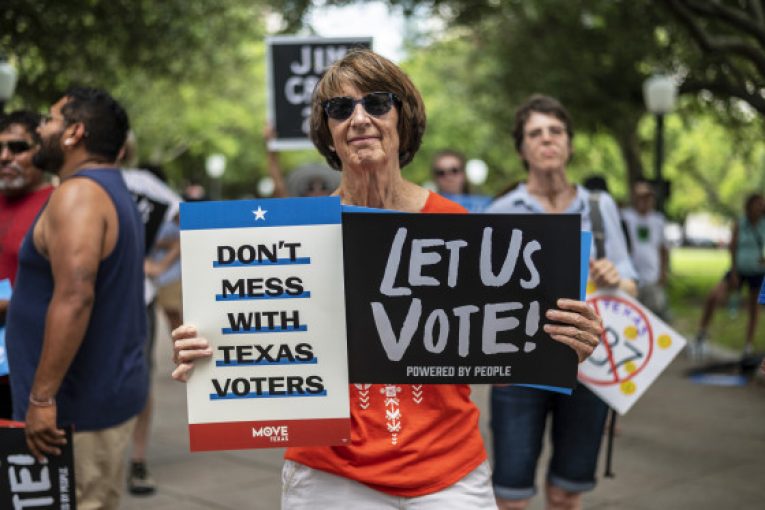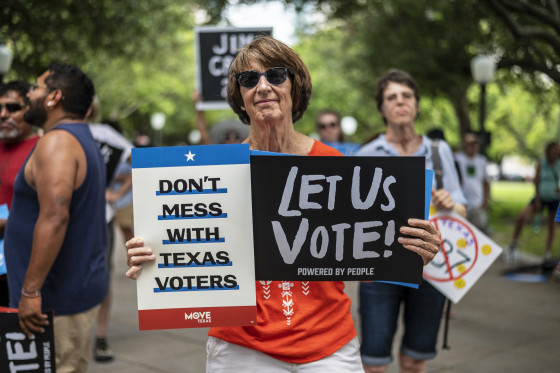

By Vanguard Staff
Austin-Texas – This week after lawmakers in Texas finally passed anti-voter SB 1, a coalition of civil rights organizations filed a lawsuit.
“SB1 is a discriminatory law that creates more unnecessary barriers and silences the voices of Texans with disabilities as well as Texans of color,” said Lia Sifuentes Davis, Senior Litigation Attorney with Disability Rights Texas, one of the co-counsel on the case.
While Ryan Cox, Senior Attorney with the Texas Civil Rights Process said, “SB1 officially cements Texas as the hardest state to vote in the country.”
The lawsuit was brought on behalf of the League of Women Voters of Texas, the Texas Organizing Project, Workers Defense Action Fund, Register, Educate, Vote, & Use your Power – Texas (REV UP Texas), and OCA of Greater Houston.
The lawsuit filed by co-council primarily from the ACLU, the organizations argue that numerous provisions of the bill violate the Voting Rights Act, the Americans with Disabilities Act, and the U.S. Constitution.
“People with disabilities, who make up 20 percent of the U.S. population, already face significant barriers to exercising their legal right to vote, such as physically inaccessible polling sites, election workers refusing to provide accommodations, mail-in ballots that cannot be used by people who are blind, and more,” said Sifuentes.
The legislation, they say, “makes it virtually impossible for members of the plaintiff organizations to vote, especially those who are more comfortable with languages other than English, those with disabilities, and who  have no option but to vote by mail.”
have no option but to vote by mail.”
Recent non-partisan polling shows most voters, regardless of political party, believe that all Texans should have equal access to the ballot box. SB 1 would not only make voting harder for all Texans, it threatens to harm communities of color and Texans with disabilities the most.
“Voters with disabilities and voters with limited English proficiency have the same right to vote as anyone else,” said Tommy Buser-Clancy, senior staff attorney at the ACLU of Texas. “SB 1 cruelly targets these voters and anyone who might assist them with increased burdens and unnecessary criminal penalties. These provisions are unlawful and part of a long history of Texas implementing discriminatory anti-voter measures. The legislation should be struck down.”
“This assault on voting rights and democracy cannot go unchallenged,” said Adriel Cepeda Derieux, senior staff attorney with the ACLU’s Voting Rights Project. “We urge the court to strike down the barriers to voting that these new illegal restrictions impose.”
“In 2018 AALDEF enjoined Texas from restricting assistance to voters with limited English proficiency,” said Susana Lorenzo-Giguere, Senior Staff Attorney at AALDEF.
She added, “With SB1,Texas is at it again. SB1’s restrictions on any assistance outside of reading and marking the ballot, like answering questions on how to use the voting machine or where to drop the completed ballot at the polling place, and SB1’s criminalization of anyone answering those questions, unlawfully restricts the broad voting assistance rights under Section 208 of the Voting Rights Act.”
“Equal access to voting is the foundation of democracy,” said Jessica Ring Amunson, Chair of Jenner & Block’s Election Law and Redistricting Practice. “This Texas bill violates the U.S. Constitution, the Voting Rights Act, and the Americans with Disabilities Act, and we are proud to fight to secure the right to vote for voters with disabilities and voters with limited English proficiency and the organizations that assist them in preserving this fundamental right.”
“For democracy to work, it must include all voices. SB 1 is an extremist anti-voter bill that raises even more barriers to voting and specifically targets vulnerable communities, especially voters with disabilities, voters of color, and elderly voters,” said Grace Chimene, president of the League of Women Voters of Texas. “SB 1 is a violation of our freedom to vote, and we will continue to fight every attempt to silence Texas voters.”
“SB 1 deliberately targets people of color, the elderly, and those with disabilities, placing illegal restrictions on their access to the ballot box. There’s no denying that this bill is an attack on democracy in our state and a transparent act of political desperation,” said Brianna Brown, co-executive director of the Texas Organizing Project.

Here’a an article where it explains the the new SB 1 rules. It sounds very reasonable, unless of course your plan is to cheat.
https://www.statesman.com/story/news/2021/08/27/texas-voting-bill-sb-1-election-law-ballot-polls/5616452001/
Removing the prohibition against Sunday voting and provisions to make it easier to overturn election results was an improvement.
Personally I don’t see why restricting the voting hours and drive through voting – things done in Harris County as safety precautions for COVID indicate a plan to cheat. I think you can be against it, but I fail to see the justification for your comment.
Additional ID requirements – I don’t see a huge need for it, but okay. They did add a correct and cure provision that makes it slightly better.
Not a fan of the poll watcher provision. If you believe it’s a problem, set up a bipartisan commission to monitor elections. There are legit concerns here. But they did improve it from the original by omitting the warning before booting.
Suing for election violations is a can of worms, but won’t have an impact on voting itself.
Republicans rejected an amendment to study the impact on minority votes – which ought to be a red flag as to what they believe the impact of this is.
Perhaps they felt it was a can of worms.
Keith, looking at the provisions one by one, how do any of the following have anything to do with “unless of course your plan is to cheat.”
— The bill would ban drive-thru voting or casting a ballot from inside a vehicle unless participating in curbside voting due to sickness or a disability.
— It also would prohibit 24-hour and overnight voting stations as COVID-19 safety measures for early voting
— Those who transport seven or more nonfamily members to a polling location for curbside voting would have to fill out a form giving their name and address and indicate whether they also provided help casting any ballots.
— Creation of a third-degree felony that carries a 2- to 10-year prison term. Specifically, unlawful solicitation and distribution of a ballot by mail, which would occur when a public official sends an application to vote by mail to somebody who did not request it. The crime also would apply to officials who authorize spending tax money for a third party to send unsolicited applications. The proposed state jail felony, with a jail term of up to two years, was in response to the Harris County clerk’s plan to send mail-voting applications to all registered voters last year.
COVID clearly created a situation where sending out mail ballots to everyone was a good public health step. How is looking out for the public health of the community a “plan to cheat”?
Once again, an article of quotes as to what it ‘does’ politically, but not actually what the provisions are. I guess I’m ‘supposed’ to do further research . . . #sigh#. Not sure the point of putting the horse in the cart.
Or you could have read the previous comments… It was an article about the lawsuit, not the law. Then again, wasn’t provided a link to the complaint either. So there is that.